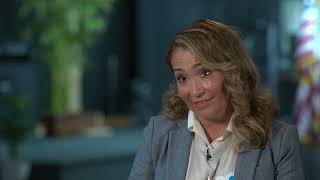Medical Care and Social Services Work Together to Meet Kids’ Needs: Gloria’s Story
Medical Care and Social Services Work Together to Meet Kids’ Needs: Gloria’s Story
CMS pilot supports health and social service providers’ efforts to help children and families
Raised on the South Side of Chicago by immigrant parents who didn’t speak English, Gloria Isabel Rodriguez understands the complex challenges faced by the people she now supports as a senior social services coordinator.
“Every day I get phone calls from families like mine,” said Rodriguez, of the All Hands Health Network at Ann & Robert H. Lurie Children's Hospital of Chicago. “We have been through crises. A lot of them have had loss or past trauma. It gives me that connection with our families.”
The All Hands Health Network is a part of the Centers for Medicare & Medicaid Services (CMS) Innovation Center’s Integrated Care for Kids (InCK) Model. The model is testing different ways Medicaid can pay for care to support all the needs of children, both inside and outside of the doctor’s office. The InCK Model is serving roughly 391,000 youth across six states: Connecticut, Illinois, Ohio, New Jersey, New York, and North Carolina.
InCK is an example of value-based care, which is health care designed to focus on quality of care, provider performance and supporting all a person's needs. Under InCK, state and local health service providers collaborate to address the medical, behavioral health, and social needs of children under age 21 covered by Medicaid. Locally based lead organizations, such as health care providers, managed care organizations, and public health departments, oversee care coordination and case management among community partners, including schools and child welfare agencies.
“It’s that connection between the social services providers and clinicians that is so unique,” said Dr. Karen Sheehan, Medical Director of the All Hands Health Network. In addition to any medical needs, “there’s a lot of other needs they have that need to be fulfilled for them to grow up to be healthy adults,” she said. “That’s what the All Hands Health Network does.”
When a mother struggled to find and pay for a new wheelchair for her growing child, the All Hands Health Network coordinators helped her connect with services to get one.
The partnership has also helped kids access early intervention programs or additional school services. English is not the first language for many of her clients, so Rodriguez regularly helps translate letters from school for families.
"It’s that connection between the social services providers and clinicians that is so unique.”
To support health-related social needs, All Hands Health Network regularly connects their patients to a food pantry at the Iglesia Evangelica Emanuel Church in Chicago. Antonio Mariscal, lead pastor, said the church has run a food pantry for the past 26 years, and currently serves 600 to 700 families a week. More recently, the church has also hosted a mobile clinic where people can receive medical care in the community rather than having to take a bus to a health center. “We have seen improvement in their health because of it,” Mariscal said.
Under InCK, the All Hands Health Network is providing vital services to historically underserved youth—keeping them healthy, and supporting their behavioral health and social needs.
“It’s pretty exciting what we’ve been able to do,” Sheehan said. “What we’ve done is really brought a lot of people together who hadn’t in the past talked to each other. The social service providers, the people helping with housing and food, weren’t as connected to the clinicians. And now, we’ve been able to bring those people together and figure out ways to improve quality of care and decrease costs.”
